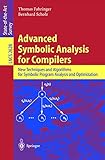Advanced Symbolic Analysis for Compilers [electronic resource] : New Techniques and Algorithms for Symbolic Program Analysis and Optimization /
Material type: TextSeries: Lecture Notes in Computer Science ; 2628Publisher: Berlin, Heidelberg : Springer Berlin Heidelberg : Imprint: Springer, 2003Edition: 1st ed. 2003Description: XII, 136 p. online resourceContent type:
TextSeries: Lecture Notes in Computer Science ; 2628Publisher: Berlin, Heidelberg : Springer Berlin Heidelberg : Imprint: Springer, 2003Edition: 1st ed. 2003Description: XII, 136 p. online resourceContent type: - text
- computer
- online resource
- 9783540366140
- 005.1 23
- QA76.758
Symbolic Analysis of Programs -- Generating Program Contexts -- Symbolic Analysis Algorithms and Transformations -- Symbolic Analysis for Parallelizing Compilers -- Related Work -- Conclusion.
The objective of program analysis is to automatically determine the p- perties of a program. Tools of software development, such as compilers, p- formance estimators, debuggers, reverse-engineering tools, program veri?- tion/testing/proving systems, program comprehension systems, and program specializationtoolsarelargelydependentonprogramanalysis. Advancedp- gram analysis can: help to ?nd program errors; detect and tune performan- critical code regions; ensure assumed constraints on data are not violated; tailor a generic program to suit a speci?c application; reverse-engineer so- ware modules, etc. A prominent program analysis technique is symbolic a- lysis, which has attracted substantial attention for many years as it is not dependent on executing a program to examine the semantics of a program, and it can yield very elegant formulations of many analyses. Moreover, the complexity of symbolic analysis can be largely independent of the input data size of a program and of the size of the machine on which the program is being executed. In this book we present novel symbolic control and data ?ow repres- tation techniques as well as symbolic techniques and algorithms to analyze and optimize programs. Program contexts which de?ne a new symbolic - scription of program semantics for control and data ?ow analysis are at the center of our approach. We have solved a number of problems encountered in program analysis by using program contexts. Our solution methods are e?cient, versatile, uni?ed, and more general (they cope with regular and irregular codes) than most existing methods.


There are no comments on this title.